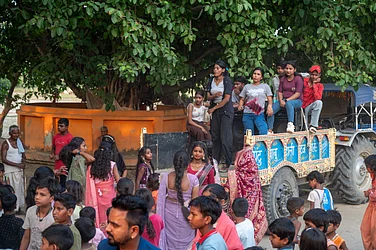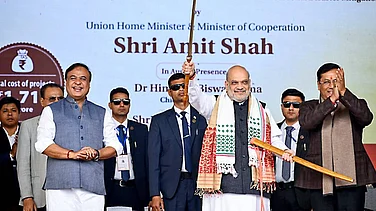With the revocation of Jammu and Kashmir’s special status in August 2019, several laws – mainly the Scheduled Tribes and Other Traditional Forest Dwellers (Recognition of Forest Rights) Act, 2006, and Scheduled Castes and Scheduled Tribes (Prevention of Atrocities) Act, 1989 – were extended to the Union Territory through Jammu and Kashmir Reorganisation Act, 2019. The tribal communities widely hailed the “historic” government move, confident that it would end discrimination and injustice that they faced on a daily basis.
The tribal communities of Jammu and Kashmir had been demanding the extension of all such laws to the UT to empower tribes since 1991 when Gujjars and Bakerwals -- the main tribal groups in Jammu and Kashmir -- were listed as Scheduled Tribes by the Parliament of India.
Before 2019, both the Acts were not applicable to Jammu and Kashmir in terms of Article 370 of the Constitution of India, which allowed Jammu and Kashmir to either adopt or abandon the Central laws. In the erstwhile state, there were no alternative laws that would provide the rights to tribes on forest land and resources or prevent them from atrocities in the name of their caste or tribe.
Tribal groups such as Gujjars, Bakerwals, Gaddis and Sippis, together constitute 1.5 million population of Jammu and Kashmir as per 2011 census—therefore, welcomed the extension of both the laws, hoping that the laws will not only end the caste-based atrocities, discriminations and injustice but will provide them access to forest resources and authorise them to independently manage, protect and govern the forests.
New laws in J&K
In December 2020, the Jammu and Kashmir government initiated the process for implementation of the two important legislations. Accordingly, four-tire Forest Rights Act Committees (FRC) were constituted across Jammu and Kashmir at UT/district/sub-division and village level (Gram Sabha FRC) to settle the claims of tribals on forest land. Further, to oversee the operation of the Scheduled Castes and Scheduled Tribes (Prevention of Atrocities) Act, 1989 in J&K, a high-powered Vigilance and Monitoring Committee headed by Lieutenant Governor Manoj Sinha was also constituted.
Till May 31, 2022, as per the government data, around 2300 claims have been settled by the authorities under Forest Rights Act (FRA). Most of these cases fall under the community rights category that recognises their rights on common grazing lands, religious places and water resources etc. The number of individual claims recognition is very low and most of these cases are under scrutiny at various levels. The data says that around 23000 claims (both community and individual) are pending before different committees constituted by the UT administration under the FRA.
As far as SC/ST Atrocities Act is concerned, a very negligible amount of cases have been filed by the SC/ST community members. Reportedly, no tribal has filed any case under the Act. However, as per local media reports, the SC community members have filed a few cases under the act.

The gaps in implementation
During my two and a half-year awareness campaign across Jammu and Kashmir about the newly extended two laws, I identified many gaps in the implementation process. Since FRCs are yet to be constituted in urban areas of Jammu and Kashmir, urban tribal couldn’t file any claim under FRA so far.
Significantly, the nodal agency for FRA implementation is the Forest Department. In the rest of the states, the Tribal Affairs Department is designated as the nodal agency. For an effective and speedy implementation of FRA, the Tribal Affairs Department or Panchayat Raj Department should be declared as the nodal agency.
In view of a J&K High Court order, reports surface about the forceful eviction of tribals from the forest land that they had occupied since centuries. Such evictions are in violation of the provisions/section 4(5) of the FRA, which categorically states that ‘no member of a forest dwelling Scheduled Tribe or other traditional forest dwellers shall be evicted or removed from the forest land under his occupation till the recognition and verification procedure is completed’ in all respects.
Notably, the eviction and fencing programmes launched by the Forest Department adversely impacted the implementation of FRA in a big way.
Due to low literacy rate among the tribes of Jammu and Kashmir, the understanding of these laws is very poor. More awareness programmes are needed to help the tribals know their rights promised under the two laws. Ironically, some officials assigned with the work of implementation of FRA are not sufficiently aware of the rules and procedures under these laws. Also, there is a lack of coordination between government officials and the village committees/gram sabha/FRC regarding physical verification of the claims.
Sadly, under the FRA no notification has been issued by any DM in Jammu and Kashmir to initiate the process of converting forest villages/old habitats into revenue villages.
Obtaining caste (ST) certificate from a tehsildar (as evidence) remains a challenge as a large number of tribes reside in the forests. The ST certificate is not to be issued without evidence of revenue land records. In Odisha state, for example, a Gram Sabha is empowered to issue Tribal Certificate for FRA purposes.
In Jammu and Kashmir, an upper committee usually reverts a claim to the village committee/Gram Sabha for review. Most of the reversions were due to lack of proper quorum or the wording of the resolution. For approval of claims, a presence of 50 percent of the total population -- having age of 18 years or above -- of a Panchayat, with one third women and 50 percent claimants is essential to form a quorum to pass any resolution for settlement of any type of claims under the FRA.
Expectations of tribes
Although J&K’s Lieutenant Governor Manoj Sinha, in his public and official interactions, has been cautioning the departments involved in implementing the FRA that tribal rights must not be infringed upon, the situation on ground is not so consoling.
However, in view of repeated assurances from high-ups, especially from Lt Governor himself, the expectations among the tribal community with regard to forest rights are very high despite the process on ground being very slow. The hope, expectations and the demands of the Tribal community can’t be met without expediting the process of FRA implementation. Claims should be cleared in a time-bound manner. Regular meetings of the committees at sub-divisional and district levels should be held to decide FRA issues.
There is an urgent need to defer the ongoing eviction drives and fencing of forests in such areas where FRA claims are still pending. In this regard, the forest, revenue and Panchayat Raj officials and non-official members of the committees must be trained regularly and orientation courses be held for those who are already trained to deal with FRA cases.
For the caste certificate, the Odisha model should be adopted, and the Urban FRA committees should be framed on priority, enabling the tribes residing in urban areas to file claims. Similarly, the Gram Sabha and village level FRCs should be taken into confidence when forest officials visit the area for demarcation of land, preparing of maps and other activities. Under FRA, the DM should issue notification inviting claims under FRA for conversion of forest villages/Old habitats into revenue villages under the act.
For implementation of the SC/ST Atrocities Act, more efforts are required including awareness among the masses and public functionaries about the act, establishment of special courts at district level for speedy hearing of such cases on the prototype of other states. DMs, SDM and Magistrates should be trained to deal with these cases at their level.
Though the things are going at a slow pace, tribal groups are by and large enthused that the extension of new laws to Jammu and Kashmir will empower them and end centuries-old deprivation and discrimination.
(Javaid Rahi is secretary of the Tribal Research and Cultural Foundation, a frontal organisation working for the rights of Gujjars and Bakarwals)





















